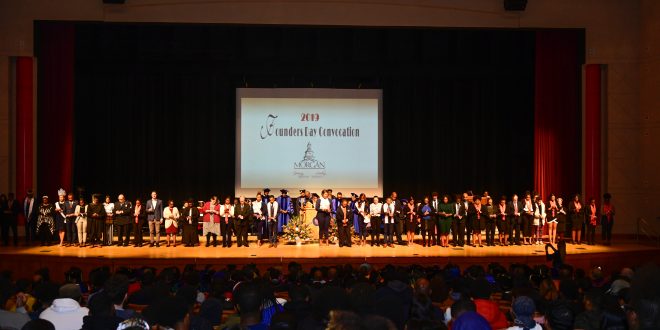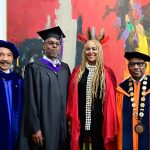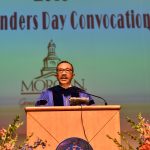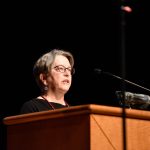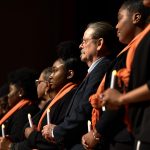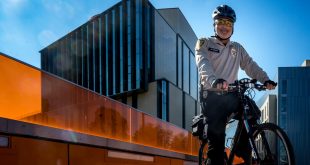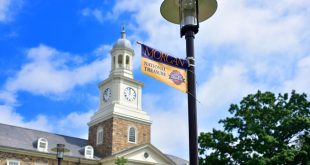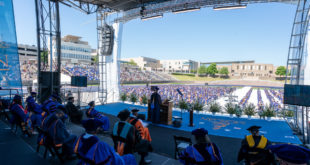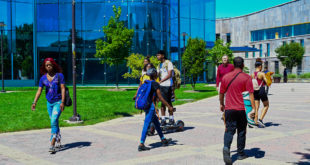Morgan State University (MSU) recognized its 152nd anniversary with a Celebration of Peace, Unity and Reconciliation today, at the university’s 2019 Founders Day Convocation. The stirring program included a recap of the racially charged events that accompanied the relocation of the Historically Black Institution to its current location, adjacent to the Lauraville neighborhood of northeast Baltimore City, in the early 1900s. A Unity Candle Lighting ceremony brought local community, government and faith leaders together on stage with MSU student leaders, faculty and administrators.
Morgan’s journey, from its charter in 1867 to its present, has many milestones. Today’s Founders Day Convocation sought to shed a meaningful light on one of them: 2019 is the 100th year of Morgan’s existence at its current campus. Carnegie Hall, the oldest building on the historic campus, was built in 1919.
Presenter Steven Ragsdale, board member of the Baltimore City Historical Society, outlined Morgan’s early history, from its launch as Centenary Biblical Institute in the basement of Sharp Street Methodist Episcopal Church in 1867, to its second move to a building at Fulton and Edmondson Avenues in west Baltimore in 1881, to the expansion plans that led Morgan’s leaders to seek land for a new campus. Those plans met fierce opposition from white residents in Baltimore who feared proximity to the black institution, first in Park Heights, where the move was blocked, then at Ivy Mill in Lauraville. A long legal battle between Morgan’s advocates and those of the Lauraville Improvement Association (LIA) ensued before Morgan succeeded in finalizing the acquisition of the campus where it now stands.
“Racism has been a terrible monster that has raised its ugly head whenever the opportunity presented itself,” said MSU President David Wilson. “…What makes today’s convocation so special is that we are deliberately revisiting one of the unfortunate chapters in our history. However, we do that with a commitment to turn the page. We are committed, with our partners in this ceremony, to turn the page on racism, to turn the page on social injustice, to turn the page on discrimination, to turn the page on hatred.”
“It’s an honor to be part of this convocation,” said Sandy Cryder, immediate past president of the LIA. “When (Mr. Ragsdale) presented on this topic at the February 2019 meeting of the Lauraville Improvement Association…a powerful visual strongly affected me. What affected me was the fact that the original source documents he displayed as part of his presentation, hateful letters written over 100 years ago by the LIA, were on the same letterhead that was still in use until a couple of years ago.”
After Ragsdale’s presentation to her group, Cryder discussed having the LIA express an apology to Morgan and Morgan Park. Later, she said, when Morgan’s assistant university archivist, Edwin Johnson, Ph.D., reached out to the LIA about participating in the Founders Day Convocation, support from the LIA membership was overwhelming.
“Lauraville is a different place today than it was at the time of Morgan College’s relocation to this area,” Cryder continued. “It is now a diverse community where 54 percent of residents are African American. Lauraville members of different races and backgrounds live amicably side by side.”
In a demonstration of unity and solidarity, representatives from surrounding community groups participated in the day’s ceremony, including:
- Baltimore City Assistant State’s Attorney
- Office of Baltimore City Mayor Jack Young
- Baltimore City Police Department
- Belair-Edison Community Association
- Cedonia Community Association
- Great Baltimore Urban League
- Gardenville Elementary School
- Glenham-Belhar Community Association
- Hamilton Hills Neighborhood Association
- Harbel Community Association
- Hillen Road Improvement Association
- Lauraville Improvement Association
- Loch Raven Improvement Association
- Montebello Elementary
- Moravia-Walther Improvement Association
- Morgan Park Improvement Association
The Rev. Dr. Bernard Keels, dean of the Morgan State University Memorial Chapel, led the Peace, Unity and Reconciliation Ceremony, which included readings, a music and dance performance by Morgan’s Modern Dance Ensemble, and the candle lighting.
President Wilson punctuated the ceremony’s end with a pledge, as the participants stood before the audience with lit candles in hand: “Today, we stand as one northeast Baltimore community and proudly declare that we stand for peace, that we stand for unity, that we stand for reconciliation in our beloved city of Baltimore.”
The production culminated with an impassioned benediction comprising reflections of peace, unity and reconciliation from clergy of diverse faiths.
MSU’s Convocation Series, launched in 1989, is a yearlong celebration of African-American history and culture marked by monthly events commemorating Morgan’s past achievements and acknowledging the imperative for even greater triumphs in its future.
 Morgan State University Newsroom Morgan State University
Morgan State University Newsroom Morgan State University
